Nissan Altima
2.5L I4 Engine Oil Change Guide
How to change the motor oil & replace the
filter on a 5th generation 2013, 2014 & 2015 Altima with the QR25DE 2.5L I4
engine.
By Paul B. Michaels Author & Photographer Auto Mechanic Since 1989 |
||
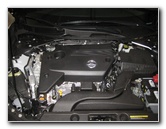 2014 Altima QR25DE 2.5L |
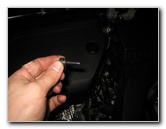 Optional - Remove Engine Cover |
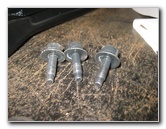 Three 5mm Hex Head Bolts |
| This
automotive maintenance tutorial was specifically written to assist
owners of the fifth generation (2013, 2014, 2015 and possibly also
the updated 2016 model year) Nissan Altima sedan in changing the
motor oil and replacing the oil filter in the 2.5 liter inline four
cylinder QR25DE motor. Owners of other Nissan vehicles equipped with the QR25DE engine such as the Sentra, Murano, Frontier, Rogue, Bassara, Serena, X-Trail, Presage and Teana may also find these DIY instructions to be helpful. The items needed to complete this procedure include a floor jack with two jack stands (or automotive ramps), a 14mm socket, a 3/8" drive ratcheting wrench and a small flathead screwdriver, a new oil filter and 5 U.S. quarts (4.6L) of new SAE 0W-20. A few compatible replacement oil filters with their part numbers are as follows: Mobil 1 M1-108, Bosch 3300, K&N PS-1008, Royal Purple 10-2876, Wix # 51358, Fram PH6607, Pennzoil HPZ-37, Purolator L14612, Mann-Filter ML 1014, Ecogard S4612 and ACDelco PF1237. |
||
|
|
||
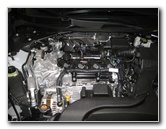 |
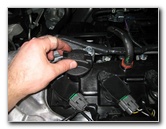 Twist Off Oil Filler Cap |
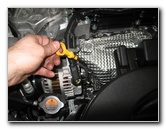 Pull Up Dipstick |
| Park the vehicle on
a level surface, engage the emergency / parking brake and chock both sides
of the rear wheels to prevent the car from moving. I already had the engine cover off to check the spark plugs, but it is not necessary to remove it in order to change the oil. If you do choose to take off the engine cover, remove the three bolts with a 5mm Allen Key wrench or a 5mm hex head socket by turning them in the counterclockwise direction. I'd recommend warming up the engine for a few minutes to help suspend any contaminants within the old oil and also to ensure that the old oil drains out quickly. Twist off the oil filler cap in the counterclockwise direction and pull up the yellow plastic handled dipstick an inch or two. Removing the oil filler cap and pulling up the dipstick will help prevent a vacuum from forming when you drain out the old oil and also allow it to drain out more quickly. |
||
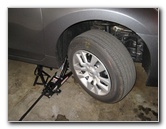 Raise Front of Vehicle |
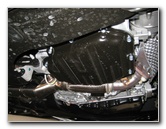 Engine Oil Pan |
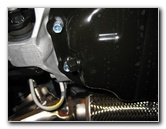 14mm Oil Drain Bolt |
| Raise the front of
the car with a floor jack and securely support it with the two
jack stands. An alternative method is to drive the car up on to automotive ramps. Slide under the front passenger side of the engine bay with a 14mm socket, a 3/8" drive ratcheting wrench and the used oil catch container. The oil drain bolt is located at the rear edge of the black metal oil pan. |
||
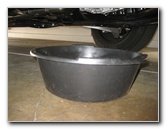 Used Oil Catch Container |
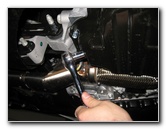 Loosen Oil Drain Bolt |
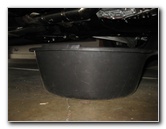 Drain Out Old Oil |
| Position the used
oil catch basin to just below the oil drain bolt. Loosen the oil drain bolt in the counterclockwise direction with the 14mm socket and 3/8" drive ratcheting wrench.
Continue spinning out the oil drain bolt in the counterclockwise direction and remove it. Allow the old oil to drain out for at least a few minutes or until the flow slows to just an occasional drip. If the drain bolt is equipped with a crush washer, inspect it and replace it if necessary. Re-insert the oil drain bolt and tighten it in the clockwise direction to just past hand tight or about 22 to 29 lb-ft of torque. Double check that the oil drain bolt is tight. |
||
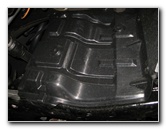 Passenger Wheel Well |
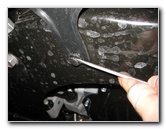 Pry Out Center of Fastener |
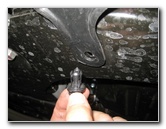 Remove Pop Rivet Fastener |
| The oil filter is
located on the passenger side of the engine in the wheel well behind a
plastic access panel. To make more working room for yourself, you may choose to turn the front wheels all the way to the right. First pry out the center part of each pop rivet with a small flathead screwdriver before removing the entire fastener. |
||
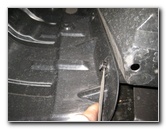 Remove Other Fasteners |
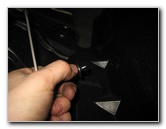 |
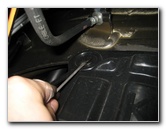 Pop Rivets At Top |
| There are four pop rivet fasteners on the outer face of the plastic panel and one on the underside. | ||
|
|
||
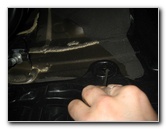 |
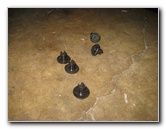 5 Fasteners Removed |
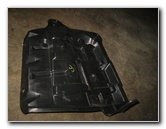 Engine Splash Shield Cover |
| Once you have removed all 5 of the pop rivet fasteners, you can pull off the plastic access panel or "splash shield" from the inside of the wheel well. | ||
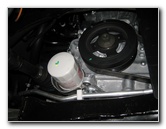 Oil Filter Location |
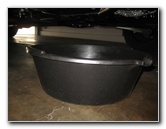 Move Used Oil Basin |
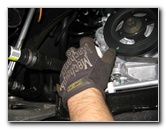 Twist Off Old Oil Filter |
| Slide the used oil
catch container to just below the old oil filter. Twist off the the old oil filter in the counterclockwise direction until it can be removed. If you have trouble removing the old filter because it is on too tight, try using an oil filter wrench such as the Lisle 63600. Allow the old oil to drain out for at least a few minutes. I recommend using either the Mobil 1 M1-108 or the Purolator PL14612 oil filters since they have the best reviews on Amazon. |
||
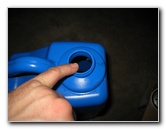 Dip Pinky Finger In Oil |
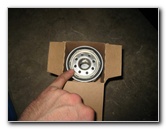 Lubricate Rubber O-Ring |
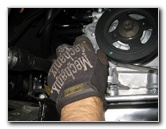 Twist On New Oil Filter |
| Dip your pinky
finger in to some new SAE 0W-20 oil and lubricate the rubber o-ring gasket
on the new oil filter. Lubricating the rubber o-ring gasket will help it form a better seal and also make it easier to remove the filter during the next oil change. Twist on the new oil filter in the clockwise direction to about 1/3 turn past hand tight. Double check that the oil filter is tight before moving on to the next steps. |
||
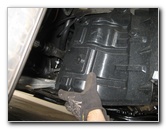 Replace Engine Splash Shield |
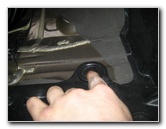 Re-Insert Fastener |
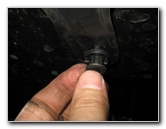 Pop In Center Part |
| Line up the black
plastic engine cover and re-insert the five fasteners. Push down the center part of each pop rivet to secure them in place. |
||
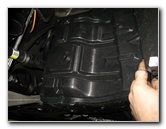 Plastic Panel Replaced |
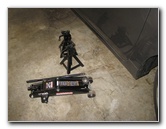 Lower Car From Stands |
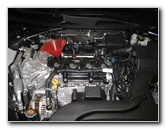 Insert Automotive Funnel |
| Carefully lower the
car from the jack stands by using the floor jack. Insert an automotive funnel in to the oil filler hole. It is much better to have slightly less oil than necessary in the engine than to run the engine after it has been overfilled. Running an engine that has been overfilled with oil may cause damage to seals, gaskets or other components. |
||
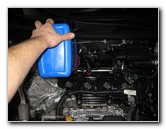 Pour In New 0W20 Oil |
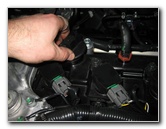 Replace Oil Filler Cap |
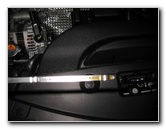 Check Dipstick Oil Level |
| Slowly pour in only
about 4 to 4.5 quarts of new SAE 0W-20 oil in to the engine. The QR25DE 2.5L I4 engine's total capacity for an oil change with an oil filter replacement is 4 7/8 U.S. quarts (or 4.6 liters or 4 Imperial quarts). Temporarily replace the oil filler cap and push down the dipstick. Run the engine for a few minutes, turn it off and then allow the oil to drain back down to the oil pan for at least 5 to 10 minutes. Pull out the dipstick, wipe it clean, re-insert it and pull it out again to check the oil level.If necessary, slowly in pour in more oil and repeatedly check the level on the dipstick until it reaches just at or below the upper metal hole near the end of the dipstick which indicates the "Full" or "Maximum" line. In the picture above, the oil level barely went past the lower metal hole which indicates the "Low" or "Add" oil mark. You may not need to pour in the entire 4 7/8 U.S. quarts of new oil in order for the oil level to reach the maximum line. Once the oil is at the correct level, replace the dipstick and tighten the oil filler cap in the clockwise direction. Be sure to record the oil change in your car's service records. It would also be a good idea to check your parking spot, garage or driveway for drops of oil which may indicate a leak from the drain bolt or the new filter. For more, check out my other
2013-2015 Nissan Altima DIY Repair & Maintenance Guides. |
||
| If you found this guide to be helpful,
please consider making a small donation by clicking on the PayPal.com
"Donate" button located to the right of this paragraph. Thank you!
(Note: I am not a registered charity. Donations are not tax deductible.) |

